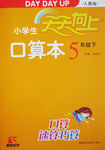题目内容
3. ,he can't put his heart into his study. (addict)
他因为迷上了篮球而不能全身心地投入到学习中。
3. Addicted to ( playing) basketball/As he was addicted to (playing) basketball

练习册系列答案
 天天向上口算本系列答案
天天向上口算本系列答案
相关题目
题目内容
3. ,he can't put his heart into his study. (addict)
他因为迷上了篮球而不能全身心地投入到学习中。
3. Addicted to ( playing) basketball/As he was addicted to (playing) basketball

 天天向上口算本系列答案
天天向上口算本系列答案